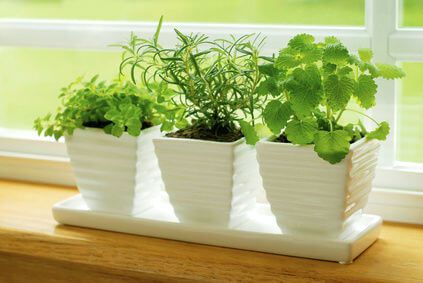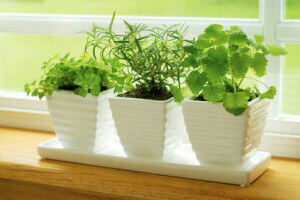
Do you love to linger in the fresh herb section of your local whole foods stores or enjoy using herbs in your kitchen?
You don’t have to pay the high price of organic herbs but can grow your own quite nicely inside your home as long as you have a nice sunny window.
Here are 8 common herbs that you can have adorning your kitchen window. Not only are these herbs an aromatic indulgence but a tasty addition to a fresh cooked meal or lovely tea.
Lemon grass – This herb is so easy to grow you don’t even have to plant it. Buy a stock of lemon grass and place it in 2 inches of water. The stalk will grow new roots and produce more stalks for you to use. Lemongrass is used in food and beverages as a flavoring, especially for tea.
Chives – Chives are very easy to grow indoors. Pull a bunch of chives with roots from an established plant then pot indoors. Cut 1/3 of the leaves off to stimulate new growth right after planting. Chives need to be near a window but require a lot of light. The sweet onion taste of chives makes them a perfect addition to soups, stews, rice or potatoes.
Peppermint – Mint is a fast growing and invasive plant. Make sure you plant it in its own container. If you don’t, it will choke out its neighboring plants. It is easiest to start mint from seed.
Place your planted pot in a window with partial sun. Peppermint tea is a great way to end a meal as it aids with digestion. You can also put some peppermint in a small dish with some baking soda for a natural air freshener.
Parsley – Parsley is a useful plant to grow indoors and has many culinary uses. This plant takes some time to get started, but it will provide you with wonderful scented foliage after it matures a bit. It is best to start from seed, but be patient. Contrary to what you might think, parsley is more than a garnish. It tastes great added to bread, meat or dressings or mixed in with a fresh salad.
Oregano – Oregano is a fairly easy to grow indoors. Start from seed for best results. Orengo loves sunlight, make sure to place it in a very bright window and away from drafts. Use oregano for all of your Italian dishes. Its sweet aroma will fill your house while you cook.
Thyme -Thyme is a great smelling herb that comes in many varieties. It is usually best to start from seed. Like oregano, it requires lots of sunlight. A bright window is a must for sun loving herbs like these. Thyme is slightly spicy and is a great addition to casseroles, soups, marinades, breads and vegetables.
Rosemary – Rosemary is fun to grow and highly fragrant, but be careful not to overwater. Too frequent watering will drown this plant quickly. Make sure the soil stays on the drier side.
Starting from seed works well. Many people enjoy the delicate taste of rosemary with beef, lamb, veal, rabbit, duck or other poultry. It also works well with eggplant and squash.
Basil – Basil is a much loved plant in the kitchen but can be a little difficult to grow. Plant from seeds or, for best results, purchase an already established plant. Keep basil leaves pinched off for best production. Salads, soups sauce, tomatoes, zucchini and stews are all tastier with a little basil.
 Tips for growing herbs indoors
Tips for growing herbs indoors
- If purchasing a new plant, get one that has been grown indoors. Bringing an outdoor herb inside can cause shock.
- Don’t expect a lot of growth in the winter. This is the plant’s off season, give it a rest and don’t overwater.
- Keep watering to a minimum. Only water herbs if their soil is really dry. Only water from the base don’t get the leaves wet. This will cause wilt.
- Clip the herbs regularly to use the leaves. Clipping frequently also helps promote new growth.
- Plant herbs in terracotta pots and put them in a tray with pebbles. This will help keep them well-ventilated which will improve growth.
- Use high-quality potting soil for stronger plants, and fertilize twice a year with an organic fertilizer. This will help keep plants healthy and productive.
-The Alternative Daily

